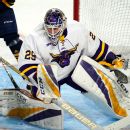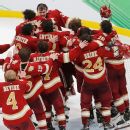The United States Anti-Doping Agency said that the Minnesota State goalie accepted a six-month ban from competition for an anti-doping rule violation.
The period of ineligibility began on April 14. McKay played his final game for the Mavericks on April 9, losing to Denver in the Frozen Four national championship game.
McKay said in a statement that the experience has been difficult for him and his family.
McKay was told on February 1 that a urine sample he took on January 23 returned a positive test for ostarine, a banned substance by the USADA.
McKay said there was no direct performance benefit from the amount.
The goalie was being tested for drugs after being named an alternate for the Beijing Games. McKay's services were not needed.



McKay suspected that the ostarine could have come from one of the supplements he had been taking. They were shipped to a lab for testing. He said that he had been taking an all-natural immune booster for 10 days and that it contained ostarine.
USADA received results from a WADA accredited laboratory that a supplement product McKay was using prior to sample collection, which did not list the substance on the label, was contaminated with it. The USADA said in its ruling that the Code gives the opportunity for a substantial reduction in the period of ineligibility.
McKay's suspension was lifted on February 3 because he was able to establish the source of the contamination. The situation was brought to the attention of the NCAA and Minnesota State athletics. The NCAA made its own ruling that McKay was eligible to complete his senior season with the Mavericks, leading them to the school's first Division I men's hockey Frozen Four championship game appearance.
McKay said that he knew the ruling would be after the season.
He won the Hobey Baker Award after setting NCAA records with 37 wins and 34 shut outs.
He accepted the six-month suspension on the advice of his lawyer.
The range for a non-intentional ingestion is between four to eight months or four to 10 months, depending on the situation. If he wanted to accept the six months, he had to make a decision. It made sense to accept the six-month ban. Now that his season is over, let the process begin.
McKay would turn pro after the NCAA season. He is a free agent after not being selected in the NHL draft. NHL teams haven't pursued him because he's only 5-foot-11 and they prefer goalies who can fill the net. His timetable for a first pro season has been complicated by the USADA ruling.
McKay said that he was still trying to figure out his future and that he could start practicing in August.